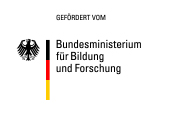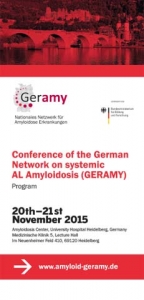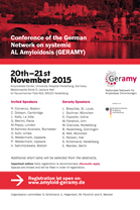20th-21st November 2015 in Heidelberg
Welcome Address
Systemic amyloid light chain (AL-) amyloidosis is a rare and life-threatening disease caused by monoclonal plasma cells in the bone marrow producing amyloidogenic light chain proteins, which accumulate in several organs. Early diagnosis is difficult because initial symptoms are unspecific. Cause of death is in most cases heart failure due to the toxic clonal light chains and excessive cardiac amyloid deposition. To date, the only evidence-based therapy to stop the production of amyloid precursors is cytoreductive treatment of the underlying B cell clone, which can be very toxic in this group of fragile patients. Currently, there is no therapy to prevent misfolding of the light chains or actively remove amyloid deposition.
GERAMY, the GERman consortium for systemic light chain (AL) AMYloidosis, was founded in 2012 with funding from the Federal Ministry of Education and Research (BMBF) in the framework of its Rare Disease Initiative. The goal was to establish an interdisciplinary, translational collaboration to increase the knowledge of the pathogenesis of AL amyloidosis and enable new developments to improve diagnosis, therapy and prognosis.
After three years of basic and clinical research by the seven partners, the consortium has now finished its first phase of collaboration. A controlled clinical trial was initiated to test the efficacy and safety of epigallo-catechin-gallate (EGCG) in patients with cardiac AL amyloidosis. In parallel, the molecular basis of the disease has been investigated using genetic, biochemical, cell biological and high-resolution biophysical methods to reveal new molecular targets and to refine diagnosis.
This conference of the GERAMY network aims to:
- Strengthen the connection within the active international amyloidosis research community
- Encourage amyloidosis specialists to share their experience in diagnosis and treatment of several amyloidosis types
- Facilitate exchange between basic researchers, pathologists, geneticists and clinicians to enhance our understanding of the pathogenesis and develop new therapeutic strategies in AL amyloidosis.
- Present and discuss the results of three years of research by the GERAMY collaborators
We are looking forward to meeting YOU in Heidelberg.
Stefan Schönland, Ute Hegenbart, Marcus Fändrich and Erich Wanker


